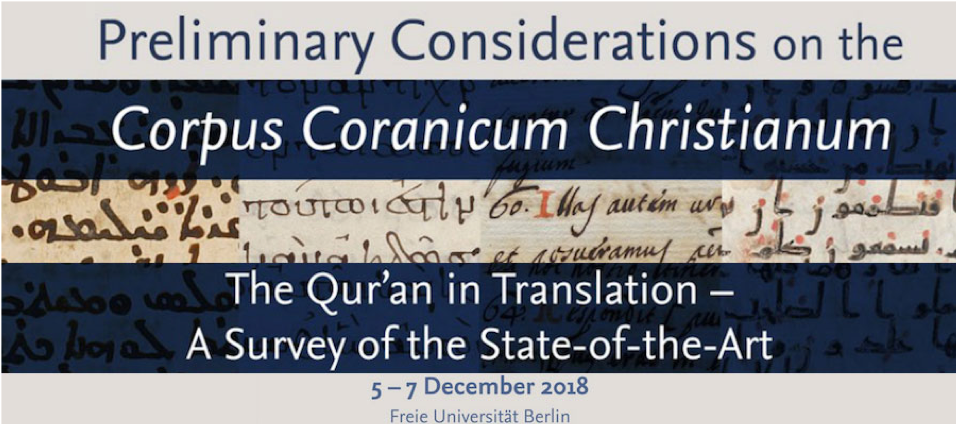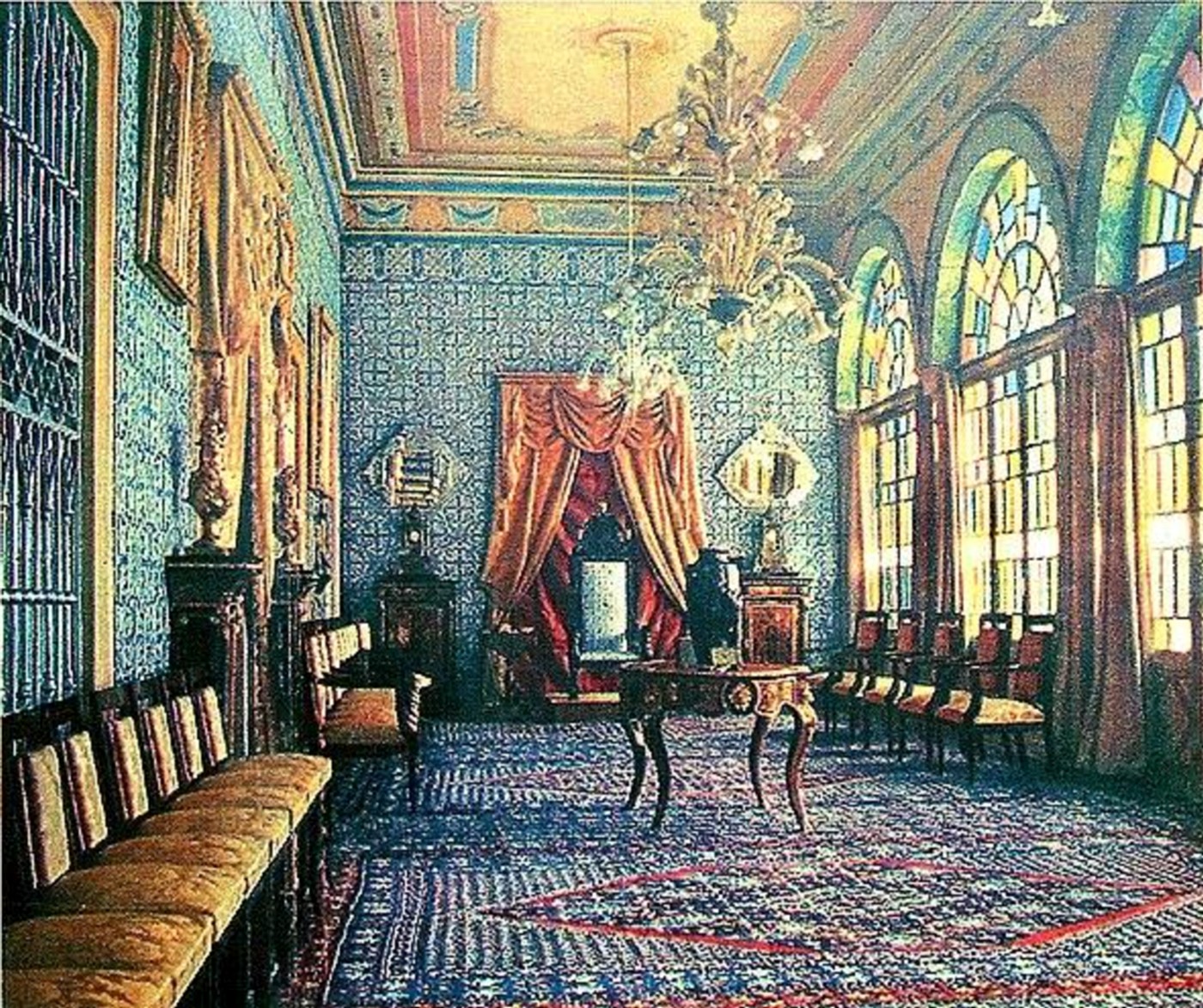Preliminary Considerations on the Corpus Coranicum Christianum: The Qur’ān in Translation – A Survey of the State of the Art | December 5 – 7, 2018, Berlin
The Corpus Coranicum project requires little introduction to the readers of this blog. Its emerging daughter project, hosted by the FU Berlin, Corpus Coranicum Christianum, developed out of the doctoral research conducted by Manolis Ulbricht, co-supervised by Angelika Neuwirth, on the early Greek translation of the Qurʾān preserved in Nicetas of Byzantium’s Refutation of the Qurʾān (c.870). At present, the long-term goal of this interdisciplinary project is to study qurʾānic translations from the seventh century to the early modern period, in the principal ‘Christian’ languages, i.e. Greek, Syriac, and Latin, comparatively, and to make these texts available online through a synoptic digital edition. The aim of this initial workshop was three-fold: (i) to bring together scholars from various disciplines working on qurʾānic translations; (ii) to establish a methodological framework for a future digital database and a comparative analysis for translation techniques; and (iii) to explore avenues for further collaboration.

The scope of the sources included in this preliminary workshop was intentionally broad, ranging from full translations to quotations, or mere allusions to the qurʾānic text. As most source material is available in Latin, the Corpus Coranum Latinum made up the most prominent part of the programme, with three panels. In a first panel devoted to the earliest sources, the translations by Robert of Ketton and Mark of Toledo were assessed with regards to the issue of the readership (Nàdia Petrus Pons) and the presence of scientific vocabulary (Julian Yolles). In addition, the qurʾānic quotations included in twelfth- and thirteenth-century Latin translations of Arabic scientific treatises were examined (Charles Burnett). A second panel examined the sources through which Latin Christians read the Qurʾān, with papers on the Latin glosses in Latin and Arabic Qurʾāns (José Martínez Gázquez), Robert of Ketton’s use of Ṭabarī’s tafsīr (J. L. Alexis Rivera Luque), and the question of the character of Ramon Marti’s Islamic sources (Görge K. Hasselhoff). The focus of the third panel was on early modern Qurʾān translations, with papers on the sixteenth-century translation by Egidio da Viterbo (Katarzyna K. Starczewska), the seventeenth-century translation and commentary by the Jesuit, Ignazio Lomellini (Paul Shore), and the recently discovered 1632 translation by Johann Zechendorff (Reinhold F. Glei). Finally, a presentation of the ERC-funded project on the Qurʾān in European cultural history, which will commence soon, should also be mentioned here (Jan Loop).
The single panel of Greek Qurʾān translations covered both the first appearances of the Qurʾān in Byzantium, as well as the late Byzantine Period. The former period was addressed with papers on the linguistic character of the eighth – ninth-century Greek translation, especially its non-classical vocabulary (Erich Trapp), and the historical background of Muslim-Byzantine rivalry behind its emergence (Jakub Sypiański). The late period involved papers appraising the knowledge of the Qurʾān and Islam by Gregory Palamas (Evangelos Katafylis) and John VI Cantacuzene (Marco Fanelli)
Papers on the Corpus Coranicum Syriacum, the language least represented at this workshop, were presented on the qurʾānic quotations in the Arabic disputation of Abū Qurra with the Caliph al-Maʾmūn, which were compared with those contained in the Garshuni version of the Legend of Sergius Baḥīrā (Yousef Kouriyhe), and on the double/triple occurences of qurʾānic verses in Dionysius Bar Ṣalībī’s Disputation against the Arabs (Alexander M. Schilling).
A special panel on the interdisciplinary nature of the overall project and its implications was entitled Corpus Coranicum Christianum – A Digitalized Trial Version. It consisted of papers on the Greek translation preserved by Nicetas of Byzantium (Manolis Ulbricht), the Syriac excerpts from the Qurʾān in Dionysius Bar Ṣalībī’s Disputation against the Arabs (Bert Jacobs), and the Latin translation by the seventeenth-century Fransiscan Germanus de Silesia (Ulisse Cecini). Prior to the workshop, these three scholars had agreed to provide micro-editions of selected common passages (Q 3:42-7; 90:1-4; 112), which were digitally processed in an online interactive edition by Joel Kalvesmaki (see http://textalign.net/quran/). The trial session continued with a presentation on the make-up and functions of this tool (Joel Kalvesmaki), and concluded with a brief comparison of the translation techniques applied to the selected materials.
Besides the work on the sources themselves, the workshop gave special attention to the use of digital humanities in the study of qurʾānic translations. This included an introductory workshop on the goals and techniques of the DH (Nadine Arndt, Oliver Pohl), as well as presentations on the Paleocoran Project (Oliver Pohl), the interactive digital edition of the New Testament (Holger Strutwolf), Ediarum (Nadine Arndt), and the valence of TEI for editing synoptic editions (Joel Kalvesmaki).
The proceedings of this first Corpus Coranicum Christianum workshop are planned for publication. A second workshop will be held in the near future.
Bert Jacobs, KU Leuven
© International Qur’anic Studies Association, 2019. All rights reserved.

